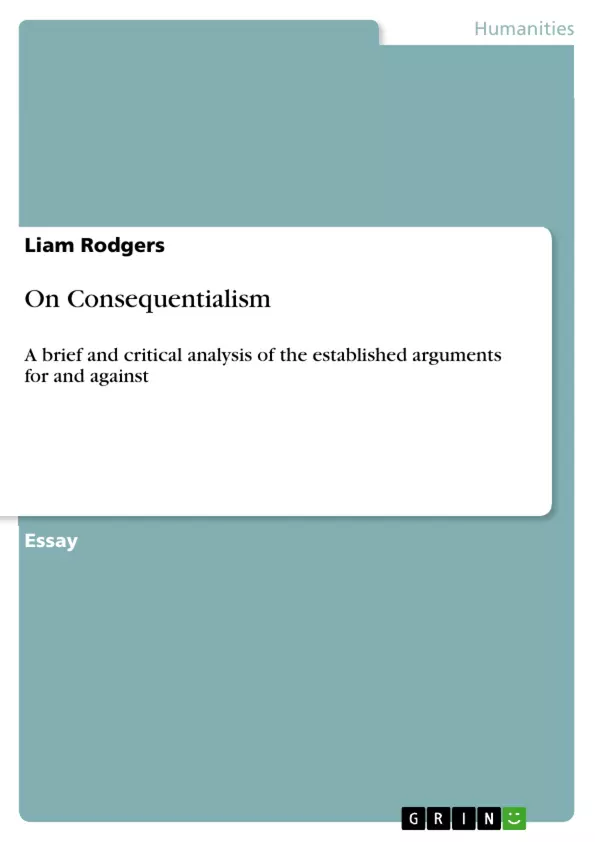There is, in modern society, a general trend of antipathy regarding morality, leading to an acceptance of unconsidered egocentric utilitarianism. This essay sets out to combat blind consequentialism in its most esteemed form, in favour of a considered approach, regardless of perspective. The outcome is a brief analysis of the concepts and arguments in one of the most prominent debates in ethics, providing a concise evaluation of the key tenets of both sides.
Inhaltsverzeichnis (Table of Contents)
- Utilitarianism (for)
- Situation Ethics (for)
- sectionary conclusion (for)
- Theological Voluntarism (against)
- Kantianism (against)
- Conclusion (for vs against)
Zielsetzung und Themenschwerpunkte (Objectives and Key Themes)
This essay examines the arguments for and against consequentialism, a theory that judges the moral value of actions based on their outcomes. It aims to analyze the fundamental moral assertions and arguments of consequentialist theory and answer the question: "Is consequentialism an effective ethical theory?"
- Utilitarianism as a form of consequentialism
- Different interpretations of consequentialism and their weaknesses
- The role of pleasure and happiness in ethical decision-making
- Criticisms of consequentialism from both internal and external perspectives
- Alternative ethical theories and their implications for moral philosophy
Zusammenfassung der Kapitel (Chapter Summaries)
This section will summarize the key points of each chapter, excluding the conclusion and final chapter.
- Utilitarianism (for): This chapter introduces utilitarianism as a prominent consequentialist theory, based on the principle of maximizing happiness for the greatest number of people. It discusses the "hedonistic" nature of utilitarianism and examines the historical development of the theory, from Jeremy Bentham's classical utilitarianism to John Stuart Mill's rule utilitarianism.
- Situation Ethics (for): This chapter explores situation ethics as another form of consequentialism, emphasizing the importance of context and individual circumstances in determining the moral value of actions. It analyzes the strengths and limitations of this approach to ethical decision-making.
- sectionary conclusion (for): This chapter summarizes the arguments presented in favor of consequentialism, highlighting the strengths of utilitarianism and situation ethics as ethical frameworks.
- Theological Voluntarism (against): This chapter introduces theological voluntarism as a contrasting ethical perspective, arguing that morality is determined by the will of God. It examines the philosophical implications of this theory and its challenges to consequentialism.
- Kantianism (against): This chapter explores Kantianism as an alternative ethical theory, emphasizing the importance of universal principles and moral duty. It contrasts Kantian ethics with consequentialism, highlighting their different approaches to ethical decision-making.
Schlüsselwörter (Keywords)
The main keywords and focus topics of this text include consequentialism, utilitarianism, situation ethics, theological voluntarism, Kantianism, moral philosophy, ethics, pleasure, happiness, duty, principles, and moral value.
Frequently Asked Questions about Consequentialism
What is the core principle of consequentialism?
Consequentialism is an ethical theory that judges the moral value of an action based solely on its outcomes or consequences.
How does Utilitarianism relate to consequentialism?
Utilitarianism is the most prominent form of consequentialism, advocating for actions that maximize happiness or pleasure for the greatest number of people.
What are the main criticisms against consequentialism discussed in the essay?
The essay explores criticisms from the perspectives of Kantianism (duty-based ethics) and Theological Voluntarism (divine command theory).
What is the difference between Bentham's and Mill's Utilitarianism?
Bentham focused on classical, quantitative hedonism, while Mill introduced "rule utilitarianism" and distinguished between higher and lower pleasures.
What is Situation Ethics?
It is a form of consequentialism that emphasizes the importance of context and individual circumstances over rigid moral rules.
- Arbeit zitieren
- Liam Rodgers (Autor:in), 2012, On Consequentialism, München, GRIN Verlag, https://www.grin.com/document/200425



